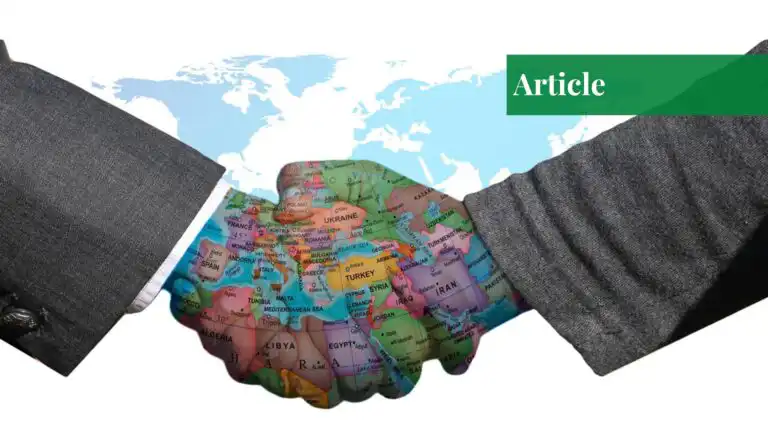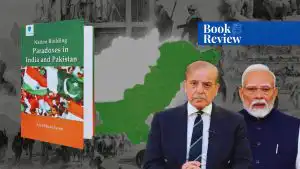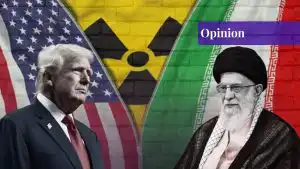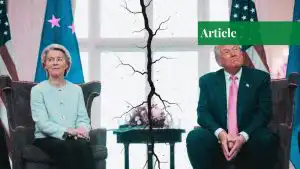Zahra Zaman is an undergraduate student majoring in International Relations at the Department of Social Sciences, SZABIST University, Karachi. She has worked as a Research Intern at the Pakistan Institute of International Affairs and has also contributed to the European Center for Populism Studies.
In a world mired in violence, dogged by dissent, and marred by disputes, we witness countries that are teetering on the brink of war while others are being bogged down in a bloodbath of warfare. Such an alarming scenario renders the security dynamics fraught with peril and aggravates the looming precarity of the international system. As we witness an imminent geopolitical quagmire, the power and history of diplomacy become indispensable as it is now the need of the hour to navigate the geopolitical landscape, which is heavily subdued by the brute force of astute realpolitik. It is a vital instrument of foreign policy.
Historical Roots of Diplomacy
Substantial empirical evidence emblematic of proto-diplomatic practices implemented in the political praxis of ancient empires exists. In light of this, the antecedents of modern diplomacy and its practices are found to have distinct identities, reflecting the historical and political context in which they emerged.

In 1887, the Amarna Tablets were discovered in Egypt, and they are regarded as the earliest records ever collected, revealing the dynamics of the ancient international system. These letters were written in the diplomatic language of Akkadian on the cuneiforms. The Pharaohs and the Kings of a myriad of kingdoms, namely, Babylonia, Canaan, Hatti, and many others located on the periphery of the Near East, interacted with each other along diplomatic and political lines, using these letters as the channels of communication.
The earliest international peace accords are known to have occurred, followed by the Battle of Kadesh in 1274 BC, which led to the signing of a peace treaty between the pharaoh and the ruler of the Hittite Empire. Diplomatic activity was also demonstrated in Ancient times when the city-state of Athens in Greece developed the “Megarian Decree,” which aimed to isolate opposing city-states and exert economic pressures on them with Megara being sanctioned, and thus, the economy was first used as a foreign policy tool. Greeks also organized the Congress of Sparta, which served as a diplomatic platform between the city-states of ancient Greece. In a similar manner, Sun Tzu in Art of War also sheds light on the relations between the kingdoms of Wu and Chin through the lens of diplomacy.
During the Middle Ages, Islamic Diplomacy rose to prominence with the Treaty of Hudaybiyyah that was ratified between Muslim tribes situated in Medina and the Quraysh tribe in Mecca in 628 AD, in addition to the diplomatic correspondence between the Muslim Caliph Umer and the Byzantine Emperor Heraclius. The Catholic Church also emerged as a pivotal mediating and arbitrating body in conflicts between the European states. The “Peace of God” movement was launched during the period of the 10th and 12th centuries in a concerted effort to protect non-combatants belonging to all social classes, including peasants and merchants, from the atrocity perpetrated during the war. Popes also exercised their spiritual authority to influence the political actions of European rulers. In 1076, Pope excommunicated German King Henry IV, which resulted in a substantial decline in his vested authority and power.
It is imperative to note that nation-states began to institutionalize formal diplomatic conventions and customs with the emergence of greater interdependence aligned with their political, economic, strategic, religious, and geographic interests throughout the period of the 14th, 15th, and 16th centuries. Numerous diplomatic initiatives were launched after the world witnessed the remarkably transformative period of the Renaissance and Enlightenment.
Amongst the diverse political endeavours, the Congress of Westphalia (1648) holds immense importance as it led to the development of the modern system of diplomacy, complementing the institutionalization of principles of sovereignty for modern nation-states as well. Similarly, the principle of non-interference in the domestic affairs of sovereign states was established through the implementation of the Treaty of Utrecht in the year 1713. As the Age of Enlightenment dominated the political scene, the intellectual movement propounded the notion of rationality in diplomacy, ushering in the epoch-making measure of forming concrete governing institutions such as the Congress of Vienna (1815).
In the 19th century, the “Scramble of Africa” emerged as a defining moment that was marked by colonial expansion and strategic competition for African resources and territories among European powers. With the outbreak of World War I in 1914, several empires reached their nadir and collapsed, allowing the formation of modern nation-states. The 1939 World War II was the final nail in the coffin of colonial and imperialist powers. Diplomacy dominated the political scene and marked the genesis of a new liberal global order, whereby peace treaties began to be negotiated, and alliances were forged in tandem.
The United States and the United Nations consolidated diplomacy and the liberal international order through collective actions. The recent form of diplomacy being practiced in the majority of countries all across the globe is modern diplomacy, which has gained prominence in the discourse of international relations and global affairs. It encompasses key elements involving the promotion of national interests, representation of the state on the global fronts, and maintenance of ties along political, economic, strategic, and many other domains. A combination of actors is involved in the diplomacy category: non-state actors, governments, and, most importantly, international organizations. Notably, this diplomacy has widened the aperture of collaboration by adopting a multifarious approach to global participation and considering humanitarian, environmental, and economic dimensions of cooperation in international politics.
Greatest Diplomats in World History: The Trailblazers of Peace
A diplomat is the epitome of strategic finesse and political adroitness. Diplomats are actively involved in vitalizing the bonhomie between states while also thawing political rivalries and making a way out of the political impasses that seem insurmountable. They engage in effective negotiations and dialogues that bring diplomatic frameworks to fruition, culminating in peace, stability, and, most essentially, security of the world.
Henry Kissinger (1923-2023)
Henry Kissinger possessed immense diplomatic acumen and political sagacity. In 1969, he normalized the ties between the superpowers, namely, the United States and the Soviet Union, by bringing the policy of detente into effect that laid the foundation of the Strategic Arms Limitations Talks (SALT) Agreement. In 1972, he also contributed towards the rapprochement between the United States and China, as the relationship between the two countries had been plagued by historic enmity. Moreover, he invented the ingenious concept of step-by-step diplomacy and/or shuttle diplomacy, which contributed towards the resolution of the 1973 Arab-Israeli conflict, facilitating the resumption of diplomatic relations between the United States and Egypt.
In pursuance of President Nixon’s Vietnamisation Policy, Kissinger initiated peace negotiations with the Le Duc Tho of North Vietnam that led to the smooth departure of U.S troops from the region and their replacement with the forces of South Vietnam, which ultimately created conditions conducive for Paris Peace Accords that put all kinetic operations on halt. On account of Kissinger’s instrumental role in the resolution of the conflict, he was accorded the prestigious Nobel Prize for Peace. In his book titled, “Master of the Game: Henry Kissinger and the Art of Middle East Diplomacy,” foreign relations analyst Martin Indyk also noted that Kissinger was an intelligent strategist who positioned the U.S. as the region’s paramount architect of peace.
Kofi Annan (1938-2018)
Kofi Annan was a Ghanaian diplomat who served as Secretary General of the United Nations and the head of the United Nations Peacekeeping. He was an ardent supporter and advocate for the rule of law and championed human rights. He served as a notable diplomat with an impressive and impeccable record of stellar accomplishments during his lifetime. The UN Peacekeeping was strengthened and equipped with more resources at his initiative. Kofi Annan was responsible for mitigating the gridlock in negotiations between the UN Security Council and Iraq.
The transition to a civilian regime in Nigeria also occurred through his efforts in 1998. Similarly, with his assistance, Timor-Leste gained independence from Indonesia. In recognition and acknowledgment of the commendable services he rendered in the name of world peace, he was bestowed with the honor of the Nobel Peace Prize in 2001. He pioneered the Peacebuilding Commission and the Human Rights Council and set the precedent by implementing the United Nations’s first-ever counter-terrorism strategy.
He even endorsed the initiative of the “Responsibility to Protect” (R2P) Principle, which was welcomed with great zeal. In the year 2006, he called for a ceasefire between Israel and Hezbollah. He actively advocated and upheld international law, as evidenced by the fact that he successfully mediated the conflict between Nigeria and Cameron over the Bakassi Peninsula by implementing the ruling of the International Court of Justice for immediate resolution of the territorial dispute. Moreover, after being appointed as the UN-Arab League Joint Special Representative for Syria, he spared no effort in introducing his six-point plan to resolve the conflict through humanitarian solutions. Furthermore, the horrors inflicted on the civilians in the Rohingya Crisis and the perpetrators who abetted the genocidal massacre were brought to light through his investigation in 2016, additionally.
Future of Diplomacy: Diplomatic Pathways to a Peaceful World Amid Geopolitical Risks
In the 21st century, the world has plummeted into a geopolitical risk as great power competition has realigned the geopolitical arena. We witness palpable tensions at the geopolitical front, with conflicts reaching flashpoints, threatening to spill over into rapid escalations. States are enhancing their military capabilities to assert dominance, which has proven detrimental to the security equilibrium. In particular, the axis of revisionist powers is advancing its strategic and ideological interests through unsavoury means to counterbalance regional countries.
US analysts are of the view that the United States could go to war with China, citing its growing assertiveness and military modernization compounded by the deteriorating relations with Taiwan, which altogether have the potential to ignite a regional conflict between the two powers. Moreover, Russia’s nuclear brinkmanship against Ukraine continues unabated with the threats to use the deadly Oreshnik intermediate-range ballistic missile by the aggressor. Iran is labelled as a “troublemaker” owing to its revanchism in the Middle East. Israel’s belligerence and provocation also instigates instability in the region through coercive tactics. North Korea has adopted a hardline stance by developing its strategic buildup and ramping up military readiness, which makes the Korean Peninsula the epicentre of military escalations with South Korea, Japan, and the United States in jeopardy. North Korean Supreme Leader Kim Jong-un has also claimed that North Korean weapons have sufficient range to target US territories and the mainland.
Such dangerous dynamics and war rhetorics are the harbingers of doom. A valid question now arises. What measures can be taken to tackle such geopolitical intricacies? A reasonable solution lies in the pragmatism offered by diplomacy. Diplomats are vital assets in this regard as they can formulate the contours of cooperation among nations in crisis management, conflict resolution, and humanitarian efforts to achieve concrete solutions to the wide array of challenges that are being encountered in the geopolitical arena.
Conclusion
Diplomacy is the blueprint for peaceful coexistence and conflict resolution to pave the way for a harmonious future. Its imperishable legacy has powerfully resonated through the annals of history and in the contemporary era of globalization. Diplomacy is attributable to finding agreements by reaching consensus and establishing common grounds, entailing the integral role of diplomats, which cannot be trivialized in achieving such desired political outcomes. As peacemakers, they avert calamitous crises through effective mediation and negotiation and strive to facilitate a thriving geopolitical environment conducive to the security and stability of the world. In the midst of a political conundrum, it is contended that diplomacy serves as the only viable key to unlocking the pragmatic solutions to the security dilemmas all across the globe, reflecting its paramount importance in mitigating hostility in the current security architecture of the world.
If you want to submit your articles, research papers, and book reviews, please check the Submissions page.
The views and opinions expressed in this article/paper are the author’s own and do not necessarily reflect the editorial position of Paradigm Shift.






